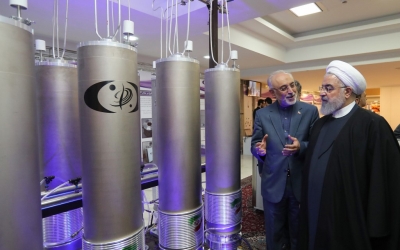Iranian press review: Health officials reject Russia's Covid-19 vaccine

Iran's health professionals reject Russia's Covid-19 vaccine
Following Iranian authorities’ approval of Russia's Sputnik V vaccine, health experts in Iran rejected the vaccine, saying that they would not use the jab for themselves and their family members.
'It's only because of Iranian's bad luck that the government is going to import a vaccine from Russia,'
- Minoo Mohraz, Iranian health official
Last week, Iran's Zarif announced that Tehran would import two million doses of Russia's vaccine by 20 March. However, Minoo Mohraz, a member of Iran's national coronavirus task force, immediately denounced the officials' decision to buy the Russian vaccine.
"It's only because of Iranians' bad luck that the government is going to import a vaccine from Russia," Mohraz was quoted by the Jahane Sanat daily as saying.
"I, as a healthcare professional, would not take Russia's Covid-19 vaccine, because so far we don't have any information about it," she added.
Stay informed with MEE's newsletters
Sign up to get the latest alerts, insights and analysis, starting with Turkey Unpacked
After Mohraz's rejection of the Sputnik V vaccine, Hossein Ali Shahriari, head of Iranian parliament's health committee, announced that he would likewise not take the vaccine made by Russia.
Meanwhile, in a letter to President Hassan Rouhani, 98 members of Iran's Medical Council, responsible for registration of all healthcare professionals in the country, urged the government to carry out more research before buying vaccines that are not approved by the World Health Organisation (WHO).
The complications about importing coronavirus vaccines began in Iran last month, when Iran's supreme leader ordered a ban on importing any kind of vaccines from the US and the UK.
Iran is the worst-hit country in the Middle East by the pandemic, with over 1.43 million positive cases and 58,189 officially registered deaths.
Iran hosts Taliban to discuss peace deal
A delegation of high-ranking members of the Taliban travelled to Iran and held official meetings with Iranian authorities as the new Biden administration puts the Afghan peace deal signed by former US President Trump with the militant group in doubt.
The Taliban delegation visit to Tehran took place amid growing concerns over the US government's decision to review the peace agreement signed by the Taliban and the Trump administration.
Local media reported that Mulla Abdul Ghani Baradar, the chief of the Taliban's diplomatic office in Qatar, led the delegation negotiating with officials in Iran's foreign ministry and the Supreme National Security Council.
According to Mohammad Naeem, spokesperson of the Taliban's office in Qatar, the Afghan delegation held talks with Iranian authorities about the two countries' relations, the condition of Afghan refugees in Iran, and Afghanistan's current political and security situation.
However, Iran's Javan daily, affiliated to the country's Islamic Revolutionary Guard Corps (IRGC), wrote that the Taliban delegation travelled to Tehran due to their discontent with the process of finalising the US-brokered peace agreement with the Afghan government.
The talks between the Taliban and the Afghan government reached a dead-end following Joe Biden's victory in the US presidential elections. On various occasions, Afghan authorities had voiced their disagreement with the peace talks mediated by Trump's administration with the Taliban.
Trump's administration had also signed a peace deal with the Taliban, based on which the US agreed to withdraw its forces from Afghanistan.
Iran supports the Afghan government's stances in intra-Afghan talks, however it opposes Kabul’s pro-US policies in the region and the presence of US forces in neighbouring countries.
After a meeting with the Taliban delegation in Tehran, Ali Shamkhani, the secretary of Iran's Supreme National Security Council, hailed the Taliban's readiness to continue the war against the US army in Afghanistan.
"In today's meeting with the Taliban political delegation, I found the leaders of this group determined to fight the United States," Shamkhani wrote on Twitter.
Tehran and Washington previously cooperated against the Taliban following the US invasion in 2001. Iran provided military intelligence to the US and let the US air force use Iran's air space during the invasion following the 9/11 attacks on the US.
However, cooperation in Afghanistan between Tehran and Washington ended after former US president George W Bush denounced Iran as a member of the "axis of evil".
Javid in Caucasus push to bypass US sanctions
Iran's Foreign Minister Mohammad Javad Zarif's five-day tour to Russia, Turkey, Azerbaijan, Armenia and Georgia was praised by Iranian reformists as an attempt to reshape Tehran's political ties with its neighbours in the Caucasus and improve its economic relations.
Iran's ambassador to Azerbaijan, Abbas Mousavi, revealed that Zarif's tour of the Caucasus aimed at starting talks with Iran's northern neighbours to build new transportation corridors, connecting the Persian Gulf to the Black Sea.
Meanwhile, Qassem Momeni, Iranian political analyst, told the Arman daily that officials in Tehran are seeking new transit corridors to Russia and Europe to circumvent US sanctions.
According to local media, Iran also seeks to play a more active role in the Caucasus, after Turkey, its regional rival, helped Azerbaijan win the October war with Armenia.
During the war over the disputed region of Nagorno-Karabakh, Iran maintained its neutrality. However, experts believe that Iran's neutrality was more beneficial to Azerbaijan.
"By remaining neutral, Iran effectively shut its borders for [Russian] arms transport to Armenia, and this move was a great help to Azerbaijan to win the war," the Arman daily wrote.
Following the collapse of the Soviet Union, Iran played an important role in Caucasus political relations. However, in recent years, Iran has shifted its attention to its western neighbours, trying to keep its influence in Syria and Iraq.
*Iranian press review is a digest of reports that are not independently verified as accurate by Middle East Eye.
Middle East Eye delivers independent and unrivalled coverage and analysis of the Middle East, North Africa and beyond. To learn more about republishing this content and the associated fees, please fill out this form. More about MEE can be found here.







